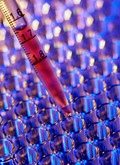Biosimilars/Research
The biosimilar landscape in Italy revealed
In Italy, health services are run at the regional level. To date, there has been no systematic monitoring of the uptake of biosimilars at a national or regional level. As such, the biosimilar landscape in Italy has not been well understood. However, a recent paper now provides an overview of the available real-world data relating to the patterns of use and the comparative effectiveness of biosimilars and originator biological drugs in Italy [1].
Danish etanercept switching study investigates withdrawal rates
A study carried out by researchers from Denmark has investigated switching from originator to biosimilar etanercept 1-year post switch [1].
Switching to biosimilars in rheumatology
Researchers from Argentina, Brazil, Germany, the UK and the US investigated switching from originator biologicals to biosimilars [1].
Additional clinical data for Cinfa’s pegfilgrastim biosimilar
Spanish biosimilars developer Cinfa Biotech (Cinfa) announced on 2 November 2017 additional clinical data for its candidate pegfilgrastim biosimilar (B12019).
Switching failures with biosimilar etanercept
A study carried out by researchers from Denmark has found that switching from originator to biosimilar etanercept does not work for all patients [1].
Reimbursement for oncology biosimilars in the US
How reimbursement issues for biosimilars might affect US oncologists was a subject discussed by Dr Rena Conti, Associate Professor of Health Policy and Economics in the Department of Paediatrics at the University of Chicago, USA [1].
Impact of follow-on biological products in the Brazilian health system
Cancer is an epidemic disease in the 21st century. However, despite consistent increases on its incidence worldwide, mortality rates have fallen, especially in developed countries [1, 2]. The victories mankind has achieved in the war against cancer result from advances in different fields, such as early diagnosis and better surgical, radiotherapeutic and systemic treatments.
Hospital specialists and pharmacists surveyed about biosimilars
Biological medicines are essential for many acute and chronic conditions, but their consumption differs widely among European countries [1, 2]. In contrast with the procedures for their approval [3], position papers from scientific societies suggest that biosimilars need to be tested in well-designed, randomized, controlled clinical trials, especially for extrapolation of indications [4, 5]. Nevertheless, switches with originators are becoming common and no serious adverse effects have been reported to date [6-8].
Positive phase III switching results for Celltrion’s infliximab biosimilar
Results of a phase III extension study have shown that Celltrion Healthcare’s (Celltrion) infliximab biosimilar (CT-P13) is shown to be comparable in efficacy and safety to Johnson & Johnson/Merck’s Remicade in switched inflammatory bowel disease patients, according to the South Korean biotechnology company.
Switching from reference infliximab to CT P13 in IBD patients
Argüelles-Arias and colleagues from the Hospital Universitario Virgen Macarena and the University of Seville in Spain carried out an observational study assessing the efficacy and safety of switching from Remicade to CT P13 in patients with inflammatory bowel disease (IBD) for up to 12 months [1].
Switching to biosimilar infliximab in IBD patients
Biological agents, such as infliximab, have transformed the outcomes of patients with immune-mediated inflammatory diseases. The advent of biosimilar treatment options, such as CT‑P13 (Remsima/Inflectra), promises to improve the availability of biological therapy.
Biosimilars in oncology in the US
As part of the Affordable Care Act of 2010, the Biologics Price Competition and Innovation Act of 2009 (BPCI Act) allows for an abbreviated license pathway for the approval of biosimilars in the US. In light of continuing increases in healthcare costs, particularly for cancer drugs, use of biosimilars is increasingly being considered as a strategy for containing the cost of cancer care, according to Dr Gary Lyman of the Fred Hutchinson Cancer Research Center and University of Washington, Seattle, WA, USA [1, 2].
Loss of efficacy after switching to biosimilar infliximab in Behcet’s patients
Authors from the Division of Rheumatology at the Hospital of Prato, Italy report on three patients with Behçet’s disease that experienced disease relapses after switching from the originator infliximab, Remicade, to biosimilar infliximab [1].
Opportunities and challenges for biosimilars in oncology
The rapid increase in healthcare costs, particularly for cancer drugs, has had a major impact on providers, practices, payers and patients, according to Dr Gary Lyman of the Fred Hutchinson Cancer Research Center and University of Washington, Seattle, WA, USA [1, 2].
Phase III switching data support long-term efficacy and safety of rituximab biosimilar Truxima
Results of a phase III extension study have shown that Celltrion Healthcare’s (Celltrion) rituximab biosimilar (Truxima, CT-P10) is comparable to Roche’s MabThera/Rituxan, according to the South Korean biotechnology company.
Physicochemical and biological characterization study of copy biological tocilizumab
Researchers in China have developed a copy biological of F. Hoffmann-La Roche’s (Roche) arthritis treatment Actemra (tocilizumab). A recent study compares it to the originator, finding it to be highly similar in terms of its physical, chemical and biological characteristics [1].
Australian prescribers’ views on biologicals naming and substitution
In a survey of 160 prescribers of biologicals in Australia, over three quarters agreed that the country’s Therapeutic Goods Administration (TGA) should insist on distinct non-proprietary scientific names for all biosimilars and reference products. The results of the survey were published just as TGA launched a public consultation on proposals for potential biological naming systems. A clear majority (98%) of prescribers who took part in the survey, run by the Alliance for Safe Biologic Medicines (ASBM), said they currently used either brand name or non-proprietary scientific names for recording and prescribing biosimilars and reference products [1]. Most (61%) wanted TGA to play a major role in naming biosimilars.
Biosimilar insulins – reducing the cost of diabetes
Will biosimilar insulins be cheaper is a question raised by authors Lutz Heinemann and Alan Carter and one that they say is a clear yes [1].
European perspective on biosimilars
In the European Union (EU), a legal framework for approving biosimilars was established in 2003. The first biosimilar Omnitrope (somatropin) was approved in 2006 [1].
Anti-drug antibody assays for biosimilars and originator biologicals
Biosimilar drug development has brought new challenges to bioanalytical ligand-binding assays used to determine drug concentration, anti-drug antibodies and neutralizing antibodies.



















